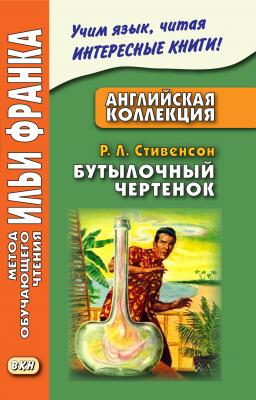ТОП просматриваемых книг сайта:
Английская коллекция. Р. Л. Стивенсон. Бутылочный чертенок / Robert Louis Stevenson. The Bottle Imp. Роберт Стивенсон
Читать онлайн.Название Английская коллекция. Р. Л. Стивенсон. Бутылочный чертенок / Robert Louis Stevenson. The Bottle Imp
Год выпуска 2017
isbn 978-5-7873-1119-8
Автор произведения Роберт Стивенсон
Жанр Иностранные языки
Серия Метод обучающего чтения Ильи Франка
Издательство Издательский дом ВКН
picture ['pɪktʃǝ], carpet ['kɑ:pɪt], storey ['stɔ:rɪ], balconies ['bælkǝnɪz]
“That is not my idea,” said Keawe; “but to have a beautiful house and garden on the Kona Coast, where I was born, the sun shining in at the door, flowers in the garden, glass in the windows, pictures on the walls, and toys and fine carpets on the tables, for all the world like the house I was in this day – only a storey higher, and with balconies all about like the King's palace; and to live there without care and make merry with my friends and relatives.”
“Well (что ж),” said Lopaka, “let us carry it back with us to Hawaii (давай увезем ее с собой на Гавайи; back – сзади, позади; обратно, назад); and if all comes true, as you suppose (и если все сбудется: «станет верным», как ты предполагаешь; to come true – сбываться /о мечтах, предсказаниях/), I will buy the bottle, as I said, and ask a schooner (то я куплю бутылку и, как я уже сказал, попрошу шхуну; to ask – спрашивать; просить).”
Upon that they were agreed (на том они и сговорились; to agree – соглашаться; уславливаться, договариваться), and it was not long before the ship returned to Honolulu (и вскоре: «и это было незадолго до того, как» корабль возвратился в Гонолулу), carrying Keawe and Lopaka, and the bottle (и привез и Кэаве, и Лопаку, и бутылку; to carry – нести, носить; возить, перевозить).
They were scarce come ashore when they met a friend upon the beach (едва они сошли на берег, как они повстречали одного знакомого на берегу; to come; to meet; friend – друг; знакомый), who began at once to condole with Keawe (который немедленно начал выражать Кэаве соболезнования; to condole – сочувствовать, сострадать, выражать соболезнование, сочувствие).
carry ['kærɪ], ashore [ǝ'ʃɔ:], friend [frend], condole [kǝn'dǝʋl]
“Well,” said Lopaka, “let us carry it back with us to Hawaii; and if all comes true, as you suppose, I will buy the bottle, as I said, and ask a schooner.”
Upon that they were agreed, and it was not long before the ship returned to Honolulu, carrying Keawe and Lopaka, and the bottle.
They were scarce come ashore when they met a friend upon the beach, who began at once to condole with Keawe.
“I do not know what I am to be condoled about (я понятия не имею, по какому случаю мне выражают соболезнования; to know – знать, иметь понятие, быть в курсе дела),” said Keawe.
“Is it possible you have not heard (разве ты не знаешь: «возможно ли, что ты ничего не слышал»; to hear – слышать; услышать, узнать),” said the friend, “your uncle – that good old man – is dead (твой дядя, славный такой старик: «старый добрый человек», умер), and your cousin – that beautiful boy – was drowned at sea (а твой двоюродный брат, красивый такой юноша, утонул в море; boy – мальчик; /разг./ человек, малый, парень)?”
Keawe was filled with sorrow (Кэаве опечалился: «был наполнен скорбью»), and, beginning to weep and to lament (и начал плакать и стенать), he forgot about the bottle (и позабыл про бутылку; to forget).
But Lopaka was thinking to himself (но Лопака /продолжал/ раздумывать: «думать про себя»), and presently, when Keawe's grief was a little abated (и вскоре, когда скорбь Кэаве немного притупилась), “I have been thinking (я тут подумал),” said Lopaka. “Had not your uncle lands in Hawaii, in the district of Kau (а не было ли у твоего дяди земель на Гавайях, в районе Кау; land – земля, суша; земельный участок)?”
heard [hɜ:d], drowned [draʋnd], sorrow ['sɒrǝʋ], abated [ǝ'beɪtɪd]
“I do not know what I am to be condoled about,” said Keawe.
“Is it possible you have not heard,” said the friend, “your uncle – that good old man – is dead, and your cousin – that beautiful boy – was drowned at sea?”
Keawe was filled with sorrow, and, beginning to weep and to lament, he forgot about the bottle.
But Lopaka was thinking to himself, and presently, when Keawe's grief was a little abated, “I have been thinking,” said Lopaka. “Had not your uncle lands in Hawaii, in the district of Kau?”
“No,” said Keawe, “not in Kau (не в Кау = в Кау не было); they are on the mountain-side – a little way south of Hookena (они находятся на горном

